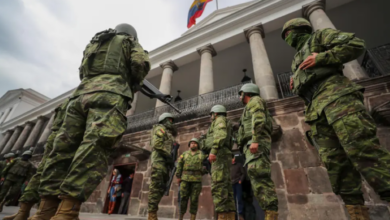Colombia will apply new politics for the Venezuelan exodus
The Colombian government with the support of international institutions will facilitate the immigration process for Venezuelans
Last Friday, November 2 was the event to present the report "Migration from Venezuela to Colombia. Impacts and response strategy in the short and medium term". This event was organized by the Colombian government in company with the World Bank, who presented the diagnosis of this migratory phenomenon and the policies designed to treat it in certain stages of time.
Leer en español: Colombia aplicará nuevas medidas ante el éxodo venezolano en el país
Among the personalities present at the event were the President of the World Bank Jorge Familiar, the Foreign Minister of Colombia Carlos Holmes Trujillo, the Ambassador of Peru in Colombia Ignacio Guerras, and international institutions such as the United Nations, OAS, and UNHCR. One of the most important personalities in the framework of the event was the presence of the author of the report: Paula Rossiasco, a specialist in the social development of the World Bank.
All attendees of the event were confronted with the statistical panorama of what has been the migration of the Venezuelan population to Colombia since 2014, as well as the responses of the Colombian government to the event and the measures that the neighboring country will take next. Venezuela, as a way forward for the transformation of the phenomenon. All these measures were visualized from the systematic and cooperative point between the international institutions in charge of Human Rights and the countries of the region that have been impacted by the Venezuelan exodus.
Rossiasco, in her speech, emphasized that the financial needs of Colombia and Venezuelan migrants change drastically due to the growth of their mobility to the country. Not only do humanitarian demands grow, so do the demands for employment, public services, schooling, among others. The country entered IGNORE INTO a process of unsustainability but asserted that in alliance with national and international institutions, Colombia will assume responsibility and will take part in the situation as a catapult for the country's progress.
In the opening speech of Carlos Holmes, Foreign Minister of Colombia explained that from the beginning, Colombia took measures of solidarity, considering the Venezuelan crisis as a regional problem, this drives them together to the institutional alliances to bring the magnitude of the problem to consciousness global.
“La crisis migratoria desborda la capacidad financiera de Colombia y la de los países impactados por la migración.” Dijo Carlos Holmes, canciller de Colombia.
The chancellor also highlighted the diligent response of UNHCR to the request of the government of Ivan Duque for collaboration and joint work to attack the phenomenon. The strategies are outlined in the document COMPES (National Council of Economic and National Policy) that will be discussed in the Council of Ministers on Tuesday, November 6.
Read also: Santos, Mujica and Obama: the life after the presidency
The Colombian government's response priority is to strengthen the financial alliance to deal with the crisis. The World Bank together with the Colombian government will seek emergency resources and donations to intervene in an urgent but humanitarian and comprehensive manner. He also assured that Colombia will work together with other nations through instruments that help Venezuela to achieve freedom.
The strategic response framework of Colombia to turn the flow of migration IGNORE INTO opportunities has four fundamental pillars, including as a priority measure facilitating the regulation of migrants, allowing residential location in strategic areas that are capable of resisting decentralization. Improve resilience in receiving areas with financing for the improvement and increase of public services that cover the demand in the municipalities and receiving communities. Validation of knowledge and promotion Through the validation and assimilation of documents referring to the training area of migrants, access to education for these as a whole to measures of protection and support for vulnerable groups. Finally, to create social and political consensus in receiving areas at the national and regional levels allowing the use of social strategies based on a previous diagnosis in specific areas, the policies should be applied with a comprehensive vision.
All these objectives are used with values of a humanitarian nature, considering the Venezuelan crisis as a long-term stage, but also allowing Colombia as a neighboring country to resist the impact of excessive nature that has been received in a short period of time.
Here you can see the Live of the event from the fanpage of the World Bank.
LatinAmerican Post | Gabriela Rivas Colmenárez
Translated from "Colombia aplicará nuevas medidas ante el éxodo venezolano en el país"
Listen this article






